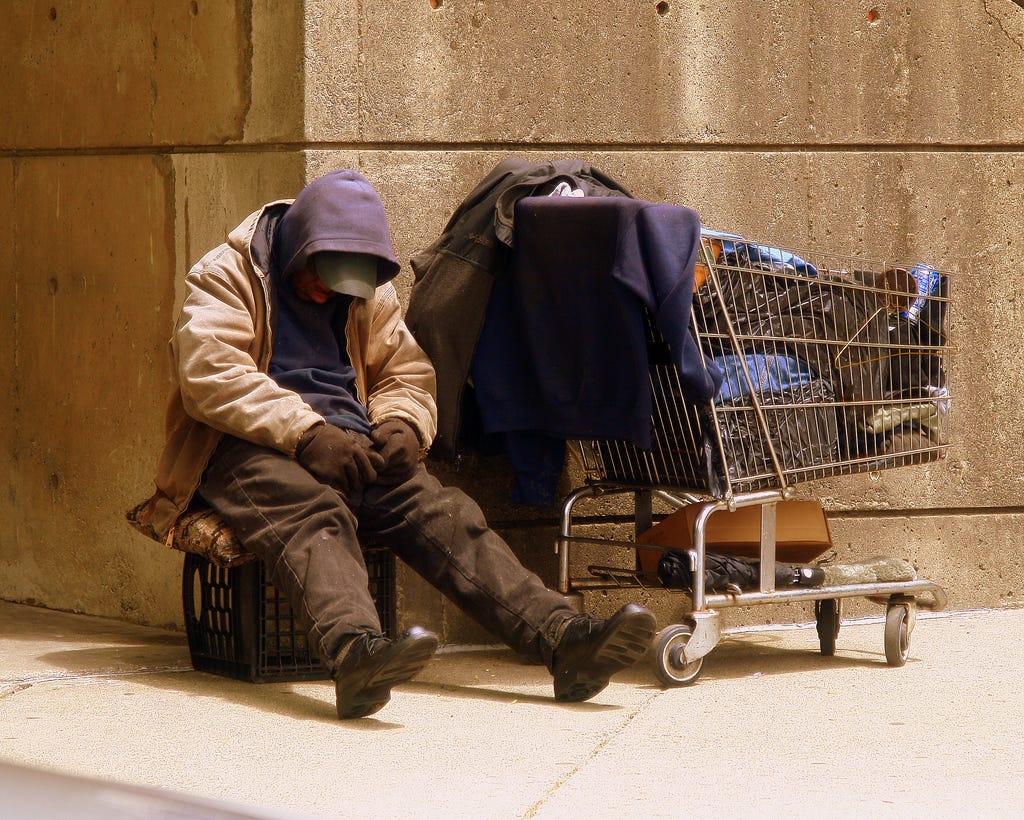Six Lessons from a Powerful First-Hand Account of Homelessness
Patrick Fealey's Article Has a Lot to Teach Us
Image by Wikimedia Commons
Shortly before HUD announced that the number of unhoused persons living in the U.S. has reached record numbers, Esquire magazine published an article by longtime journalist Patrick Fealey. It is the best first-hand account about the experience of being homeless that I have ever read. The article, “The Invisible Man,” is online here, and it is not behind a paywall.
Like hundreds of thousands of other Americans, Fealey lives in his car. In eviction court, we routinely see clients—including whole families--whose only post-eviction option is to do the same. Kevin and Samantha and their infant daughter sleep in their Ford Focus, then take turns watching the baby while the other one works a shift at a fast-food restaurant. Leonard lives in his compact Dodge pickup, storing his belongings in plastic tubs in the bed of the truck. When Kevin’s and Smanatha’s paychecks come in, they will sometimes pay for a night at a motel where they can shower and sleep laying down.
Often, our clients explain that they have been forced to choose between paying the rent and their monthly car loan payment. Often, they choose the latter. The car payment is far less, and they know their car is both emergency shelter and the only way they can get to their jobs.
Fealey’s riveting article provides at least six lessons for all of us who want to respond to the struggles of our unhoused sisters and brothers.
1) Safe Parking is Needed. Fealey’s account of being harassed by police while parking in public places, almost murdered when he left his car to go to the bathroom, and bullied out of parks and WalMart parking lots underscores how important “safe parking” programs are. In my hometown of Indianapolis, Safe Park Indy just launched this fall, and almost immediately had hundreds of people on their waiting list. Of course, it is an outrage that such a service is necessary. But it is. So, while we work for housing for all, we must ensure our neighbors have protected, legal overnight parking, along with access to restrooms, phone charging, and clean water. It is a lifesaver.
2) Disability Incomes Condemn People to Grinding Poverty. Like at least twelve million other Americans, Fealey cannot work due to a disability. But his Social Security disability monthly income of $960 is not even enough to cover food and gas and other essentials, let alone rent. The maximum monthly checks for Supplemental Security Income, SSI, are only $967. That amount is far, far below the cost of minimal survival, despite it being designated for people who have been legally found to be unable to generate any more income.
3) Healthcare Gaps Cause Pain. Fealey’s lack of dental care causes him constant pain, recurring infections, and severe limits on what food he can chew. “Eating is torture,” he writes. Fealey avoids going to see his physician, too, because he owes unpaid copays from previous treatment.
4) Unhoused People See How We React to Them. In addition to physical illness, being unhoused takes a huge psychological toll. The rest of us contribute to it. Fealey writes:
The toughest parts of homelessness have been surviving the poverty and the marginalization, discrimination, and hostility from the non-homeless population. It’s usually subtle, this hostility. People pull in to visit the lighthouse or the beach or wherever I am, see me, and immediately park somewhere else. All day long. They are so afraid.
5) Shelters are Not the Answer. Even when shelter space is available, it is not a long-term solution. For many people, as we have written about before, emergency shelters are not even a viable short-term solution. Fealey is in that category. His dog Lily is an emotional and physical lifesaver for him, and his experience being threatened at shelters underscores how dangerous they can be.
6) We Need Cash; They Need Cash. All of us need money to pay our living expenses. That is true for unhoused persons, too, as it is for our clients in eviction court. Fealey, like others who live in their cars, has to run his car engine at times to stay warm at night. He needs to eat. But when he requests help from agencies, no one will help him with gas or food money. He usually is referred to dead-end applications and programs that cannot assist him.
Cash help for unhoused people has been proven time and again to be transformative. Thankfully, this truth has been demonstrated for Fealey as well. Readers of his article set up a Go Fund Me page that raised a substantial sum. He now has much-needed dental care and a temporary place to stay.
As Fealey’s eloquent article reminds us, every other person who is unhoused or on the verge of eviction deserves the same.






I agree that cash assistance is one of the common sense approaches to poverty to help someone back on their feet. It is also important to be strategic in how to give aid in a way that does not compromise a person’s existing assistance.
People receiving Supplemental Security Income (SSI) are penalized when they receive cash gifts or even part-time wages. It is a horrible catch 22 to be disabled but not be permitted enough income to survive.
Ideally, having affordable, which might mean free, housing makes an incredible difference. Unfortunately, there is not enough affordable housing for all who qualify for it.
Raising minimum benefits and allowing people to receive cash assistance from family members without penalty would help people avoid homelessness.
Excellent article! Thanks for sharing it, major and solutions.